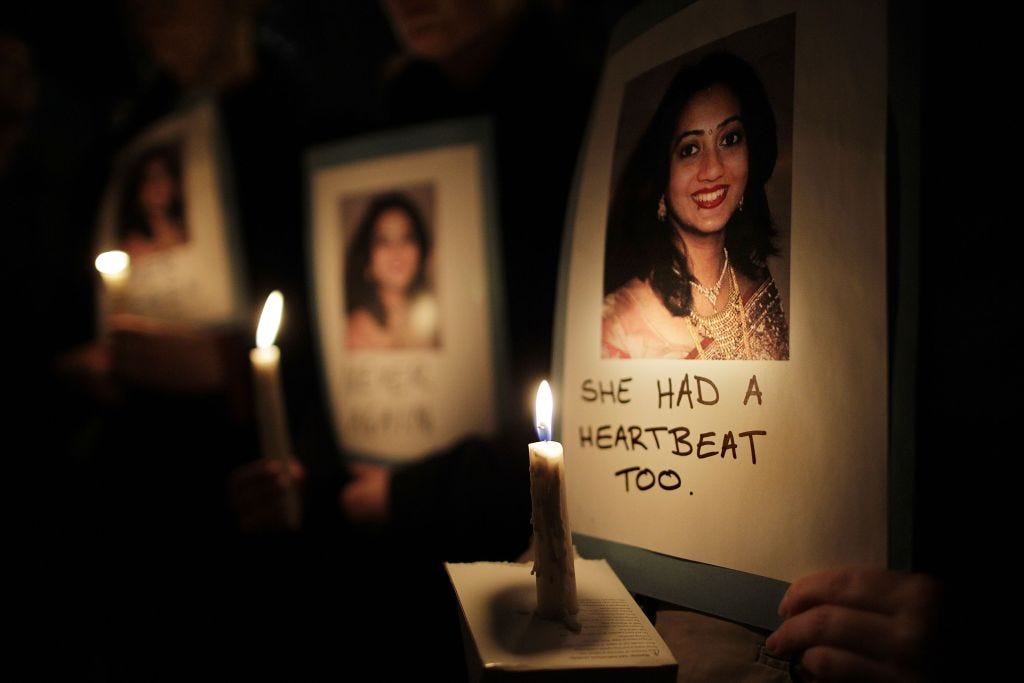How to Report Post-Dobbs Deaths
The New Yorker reports that a woman has died—so why not call it what it is?
Today, The New Yorker published a heart-breaking piece about Yeniifer Alvarez-Estrada Glick, a 29 year-old woman who died a few weeks after Roe was overturned. In the headline, the magazine asks, “Did An Abortion Ban Cost a Young Texas Woman Her Life?”
The answer, without a doubt, is yes. So why is it so hard to say so?
Anyone who works in the abortion rights world knows that bans have killed multiple people since Roe was overturned. The public hasn’t heard their stories, though, because families understandably don’t want their loved ones’ lives and deaths picked apart by reporters and anti-abortion activists.
It’s only a matter of time, for example, before Republicans and conservative groups claim that Yeni’s death had nothing to do with Texas’ abortion ban. They’ll point to how the young woman could be inconsistent taking her hypertension medication, or the time she missed an appointment with a maternal fetal medicine specialist. They will find a way to blame her.
I really do have empathy for mainstream publications. One of the challenges in reporting these stories is that abortion bans don’t exist in a vacuum: they’re part of a broader system that fails women in multiple ways. Whether it’s health care costs, racial and gendered bias, maternal health deserts or the proliferation of religiously-affiliated hospitals—there are an infinite number of dangerous combinations that can contribute to deaths like Yeni’s.
But nuance doesn’t erase the obvious truth: Abortion bans kill. We have to be willing to say it.
Yeni would be alive if she was given an abortion. Yet this young woman with hypertension, diabetes and a history of pulmonary edema was never even talked to about ending her pregnancy. Not when she went to the emergency room of a Catholic hospital just 7 weeks into her pregnancy with breathing problems, not when she visited an affiliated OBGYN who told Yeni she was at risk of having a heart attack and stroke. Abortion wasn’t even mentioned when Yeni was so ill that she had to be transferred to a bigger hospital where records stated she was at “high risk for clinical decompensation/death.”
As OBGYN Joanne Stone, former president of the Society for Maternal-Fetal Medicine, told The New Yorker, “If she weren’t pregnant, she likely wouldn’t be dead.”
To be clear: reporter Stephania Taladrid does an exemplary job with this piece, and her investigation makes plain that Yeni’s death could have been prevented with an abortion. But the editors at The New Yorker did Taladrid’s work an injustice by framing that very obvious fact as a question.
I know how important it is to be precise and careful—especially with a story like this one. I understand wanting to preempt criticism. But what happened to Yeni isn’t debatable.
As more of these stories emerge, the anti-abortion movement will pressure the media to equivocate about what’s killing women. They’re desperate to muddy the waters and shirk blame—and they’ll use the nuances of pregnancy and healthcare to do it. We can’t let that happen.
When conservatives inevitably respond to this piece—and the many that will surely follow—with lies and obfuscation, please remind them of some of Yeni’s last words:
“I’m alone and scared.”
“Where is my mom.”
“I want to live.”




I'm feeling so many emotions at once it's hard to describe. My hypertension was why I got sterilized after the Dobbs decision. Texas is officially and undeniably killing women exactly like me.
A lot of people have gotten really snotty with me over the years, poo-pooing politics as "it's just politics, why do you care so much?" Or "why do you get so upset about politics." It's been part of the Republican agenda to make politics a bad word so people disengage. There's also this cynicism about politics that people think make them sound above it all and sophisticated. I think it makes them sound lazy and misguided. Politics is just life. It's the vehicle by which we exert our will on the rest of society. When you have a minority that wants to literally take your rights away, when you have a minority that wants to KILL you, you can't afford to disengage. It's why we're all here struggling through this together.
In my jumble of emotions there's one more that stands out. I just want to say that I'm so grateful for all of you, Jessica, and this community for being brave enough and strong enough to keep caring. Even when it's devastating. Thank you <3
I am far from being a lawyer but there is a golden nugget in this article that should get more attention: "Our job is to get both through the pregnancy safely, but that’s not always possible. And it’s very frustrating to have your hands tied because the patient who you need to save is not the one that’s protected by law.” How does it happen that woman's personhood is lessened when she becomes pregnant? This is an undeniable example of discrimination.